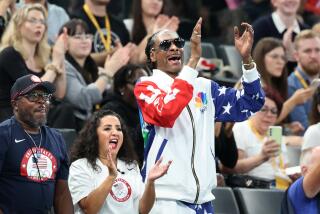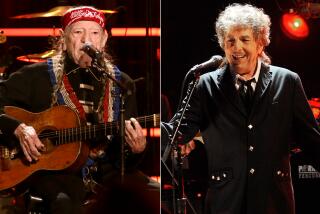Jamming together again at the Bowl
THEY won’t pick up a horn or sing a song, but they will be two of the most visible personalities at the Playboy Jazz Festival this weekend: Hugh Hefner and Bill Cosby.
Hefner is inseparable from Playboy, of course, as the magazine’s founder and a dedicated jazz fan. When he makes his entrance into the Hollywood Bowl from stage left on Saturday, every camera in the venue will focus on Hefner and his three “girl friends” (his description), Holly, Bridget and Kendra, as they wend their way to the front row center box.
Just back from a European tour (“We did five countries and eight cities in two weeks,” he said) celebrating his 80th birthday, Hefner views the fest as one of Playboy’s signature events.
“I’m in a nostalgic mood these days,” he says, “and jazz -- and films -- play a vital role in the echoes of my past. Our first jazz festival took place in Chicago in the ‘50s, celebrating the magazine’s fifth anniversary. And it was all unreal for me, the fact that I was rubbing elbows with, and getting to know, people who had been my idols and icons from when I was in high school.”
The initial Playboy Jazz Festival at the Hollywood Bowl in 1979 was actually intended as a one-time weekend celebration of the magazine’s 25th anniversary.
“Little did we know that the response would be so rewarding, or that it would have such good legs and get such support year after year,” Hefner says.
A traditionalist at heart -- he frequently refers to his affection for legendary ‘20s cornetist Bix Beiderbecke -- he looks forward to this year’s New Orleans tribute, with the cross-generational presence of native sons Branford Marsalis, the Preservation Hall Jazz Band and 22-year-old trumpeter Christian Scott.
Hefner is also looking forward to the return of Cosby as the show’s musical maitre d’. After taking off for a year, Cosby returns for his 24th season.
Unknown to audiences, Cosby keeps the musicians steady.
“I remember once telling John McLaughlin, ‘Now, man, when you go out there, you’re going to hear people talking, and they’re going to sound like they’re not paying attention. But you have to understand that they’ve driven a long way to hear you. Even if it turns out that out of 18,000 people, you’re responsible for 880 tickets -- those 880 tickets were bought by people who came to see you,’ ” Cosby recalls.
He also values the memories of last appearances (by Nat Adderley in a wheelchair, a final moment with Richard Pryor), as well as the unpredictable -- a bizarre moment in 1984 when bassist Jaco Pastorius broke down on stage. (“I held him, trying to settle him down,” Cosby says, “and, you know, it was strange, but he was as light as a feather.”)
Cosby’s “greatest moment” dates back to a performance in which the great vibes player Lionel Hampton followed Grover Washington Jr. on stage.
“It was dark, and Lionel was the last act,” he recalls. “When Grover went off, they were cheering for the encore, which they weren’t going to get, so they began leaving in droves. I looked around and I said, ‘Poor Hamp.’
“The turntable turned and Hamp’s band came out. He took one look around, then came over to me and said, ‘Hey, you watch this now!’ And he went back to his vibes and hit one note -- bing! And the band answered, bong! And he did it again, bing! bing! and the band responded, bong! bong! Suddenly, I saw people coming back in, peeking to see what was going on, heading back to their seats. The next thing I knew, I was laughing so hard with happiness that the tears were coming out of my eyes.”
More to Read
The biggest entertainment stories
Get our big stories about Hollywood, film, television, music, arts, culture and more right in your inbox as soon as they publish.
You may occasionally receive promotional content from the Los Angeles Times.









